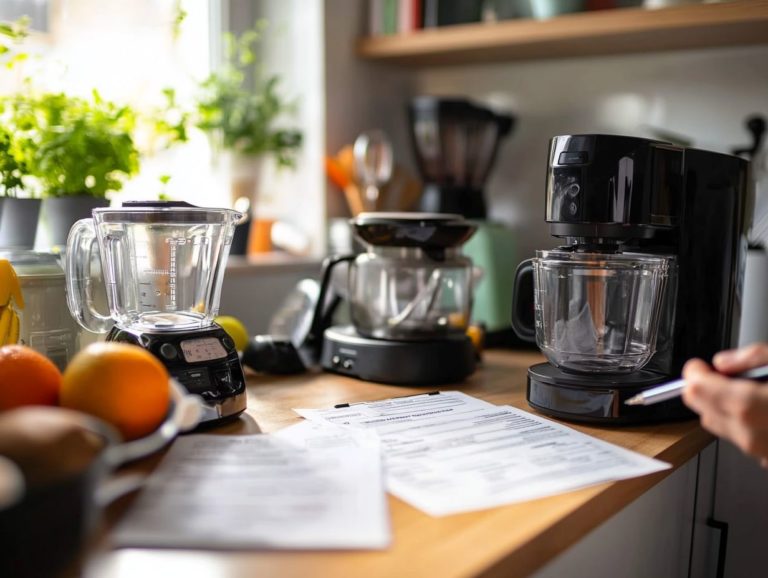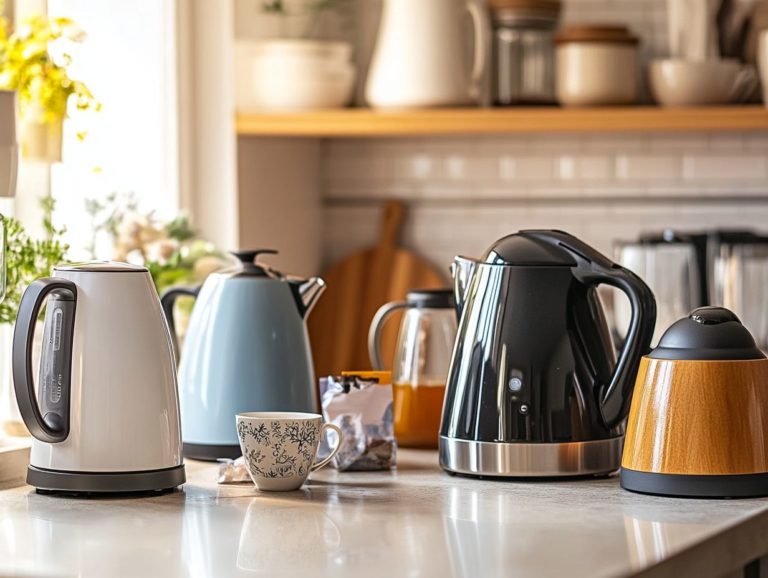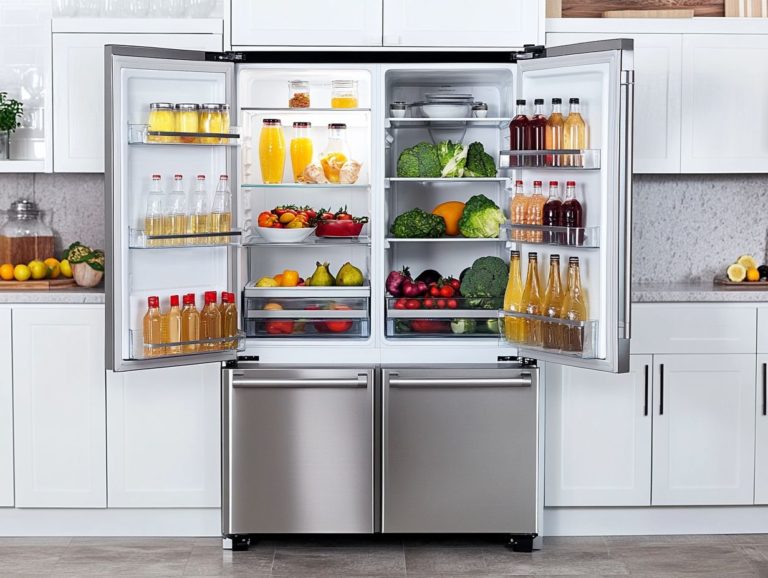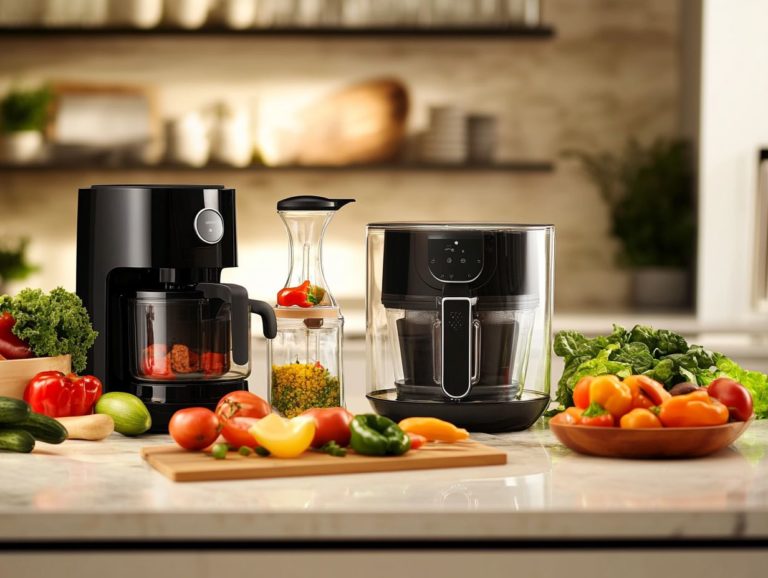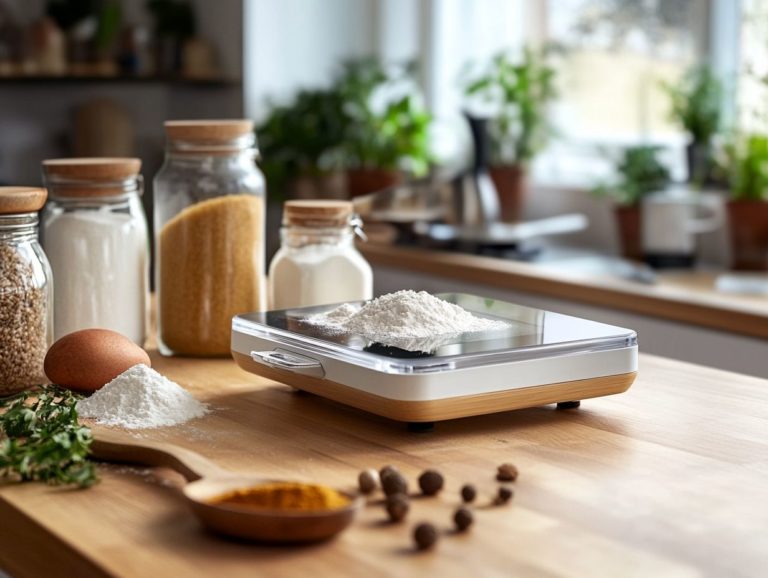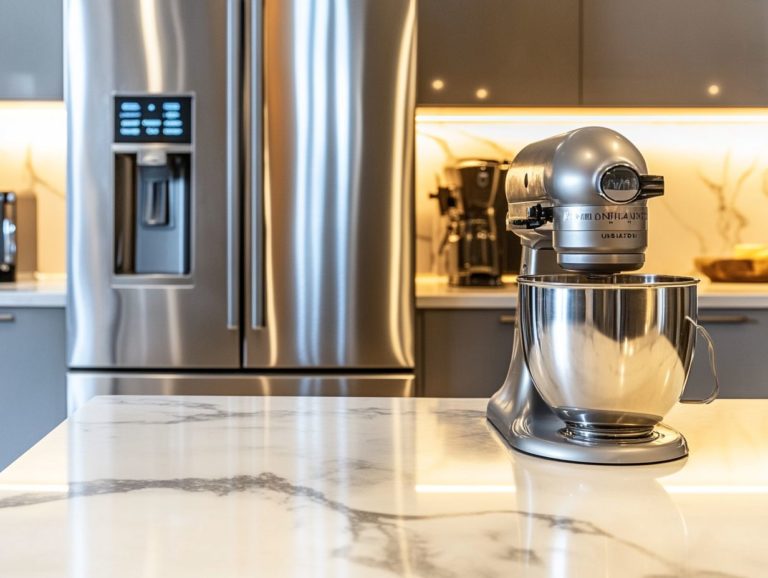How to Choose the Right Kitchen Cookware
Choosing the right cookware for your kitchen can truly transform your cooking experiences.
With an array of materials, styles, and safety considerations, shopping for cookware may feel daunting. This guide will simplify the process, breaking down the various types of cookware and the factors you should consider based on your cooking habits and budget.
You’ll also learn essential maintenance tips and decide whether to invest in cookware sets or individual pieces. Get ready to elevate your cooking!
Contents
Key Takeaways:
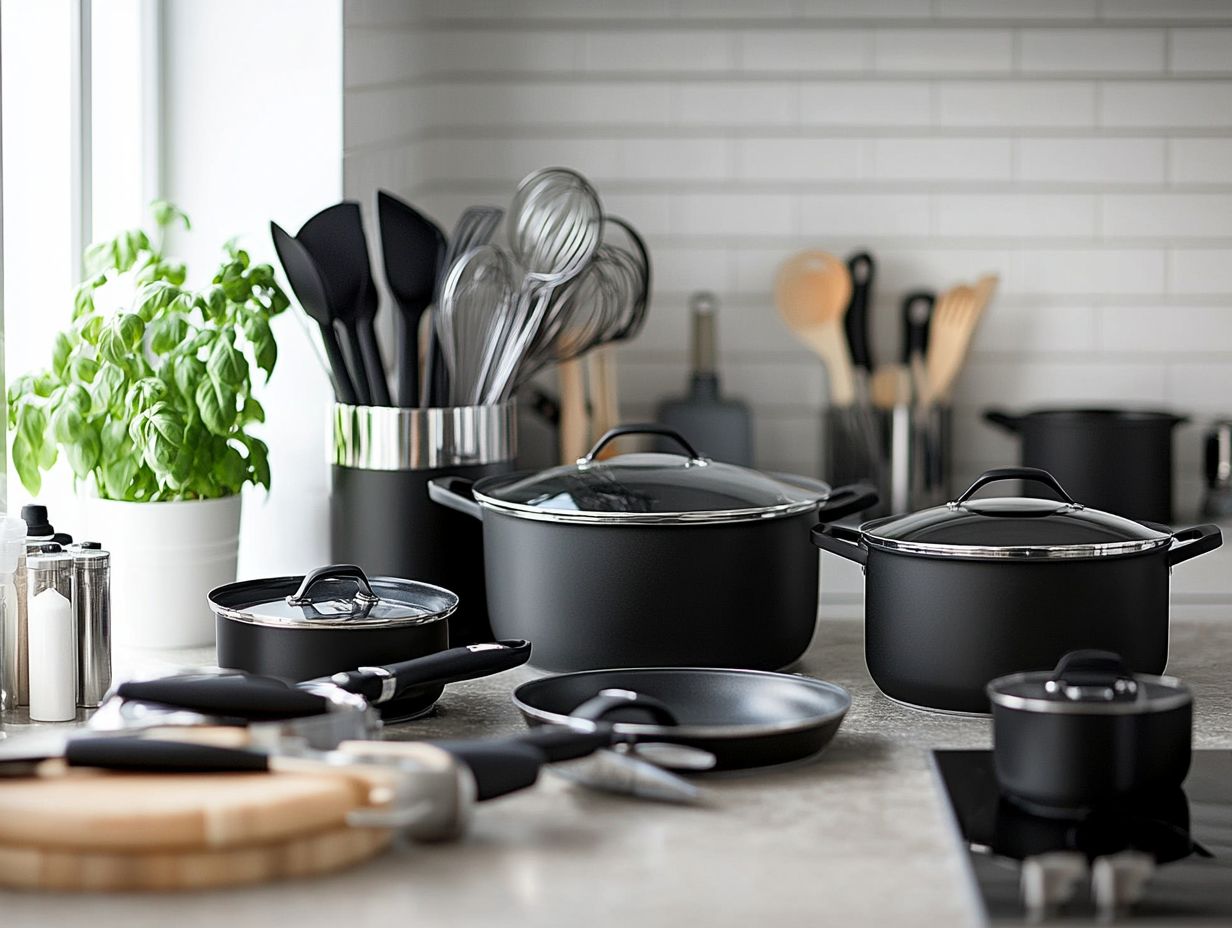
- Choose cookware based on your cooking needs.
- Opt for non-toxic and certified safe materials.
- Maintain your cookware for longevity.
- Decide between sets or individual pieces based on your budget.
Types of Cookware
Understanding the types of cookware is essential for meeting your cooking needs. Each material—stainless steel, cast iron, aluminum, and copper—has its own advantages, influencing how well it transfers heat and its durability.
Whether you’re searching for a nonstick skillet for effortless frying or a sturdy Dutch oven for slow-cooked casseroles, choosing the right cookware can enhance your culinary journey.
With options ranging from comprehensive cookware sets to specialized individual pieces, understanding what’s available gives you the power to make informed choices that align with your cooking style.
Overview of Different Materials
Different cookware materials cater to your diverse cooking needs, each with its own advantages and disadvantages that can impact your culinary results.
Stainless steel shines with its durability and rust resistance, making it a fantastic choice for browning meats.
Cast iron is revered for its exceptional heat retention, perfect for frying and baking. However, it does require regular seasoning—coating with oil to keep it nonstick.
Aluminum, being lightweight and having superb heat conductivity, is ideal for quick temperature adjustments, while copper offers precise control over cooking temperatures but requires more attention to prevent tarnishing.
Each of these materials plays a crucial role in ensuring you have a well-rounded set of essential cookware.
Factors to Consider When Choosing Cookware
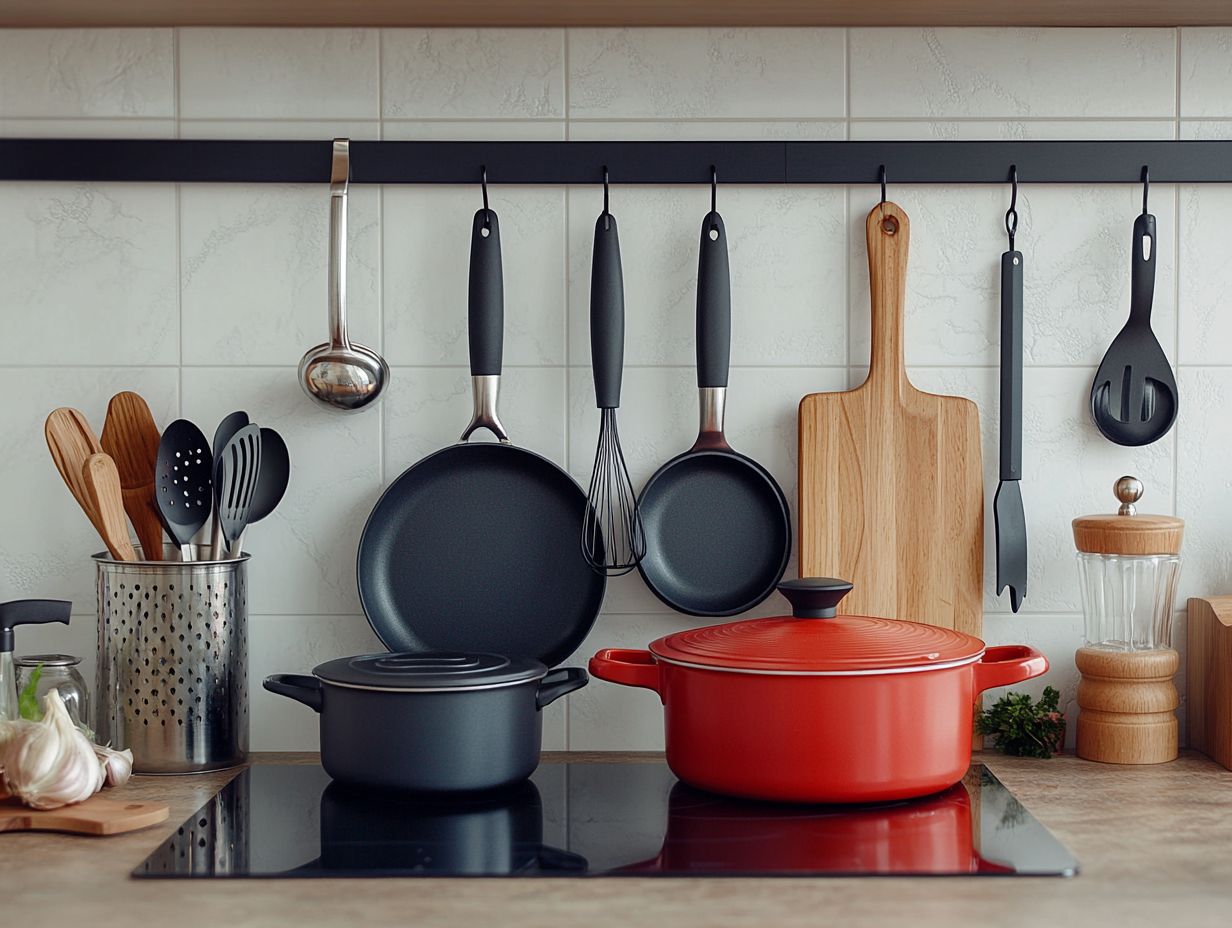
Selecting the right cookware requires understanding various factors that align with your cooking needs and lifestyle choices, such as materials, budget, and durability.
Whether you’re just starting in the kitchen or have honed your skills over the years, knowing how to evaluate elements like how well the material transfers heat and maintenance requirements can greatly elevate your culinary experience.
Furthermore, the price range for cookware sets and individual pieces can vary dramatically, making it crucial to choose options that offer the best value for your investment.
By thoughtfully considering your cooking habits and preferences, you can ensure that your kitchen is outfitted with essential cookware that excels in quality and functionality.
Cooking Needs and Habits
Understanding your cooking needs and habits is essential when selecting the perfect cookware to match your culinary style.
Different types of cookware can elevate your cooking experience, leading to better results and increased enjoyment in the kitchen.
If you often prepare quick weeknight meals, a nonstick skillet becomes an invaluable tool for everyday frying, simplifying cleanup.
If you relish creating hearty stews, a sturdy Dutch oven designed for slow-cooked dishes could be your best friend.
Whether you’re a baking enthusiast needing a versatile baking sheet or a gourmet chef seeking precision with a stainless steel sauté pan, recognizing how each piece of essential cookware aligns with your culinary tasks can transform your kitchen adventures.
Start exploring your cookware options today and unlock your kitchen’s full potential!
Budget and Durability
When choosing cookware, balance your budget with durability. This ensures that your investment meets your long-term cooking goals.
The right materials can greatly affect the performance and lifespan of your kitchen essentials.
For instance, stainless steel cookware may have a higher initial price, but it endures wear and tear, making it a smart choice for dedicated home chefs.
On the other hand, non-stick options may seem budget-friendly initially, but they often need replacing in just a few years, leading to unexpected costs.
Then there’s cast iron—an investment that can last a lifetime with proper care. It’s an excellent choice for those who want both cost-effectiveness and durability.
Know these trade-offs to make smart cooking decisions that benefit you.
Non-Toxic and Safe Cookware Options
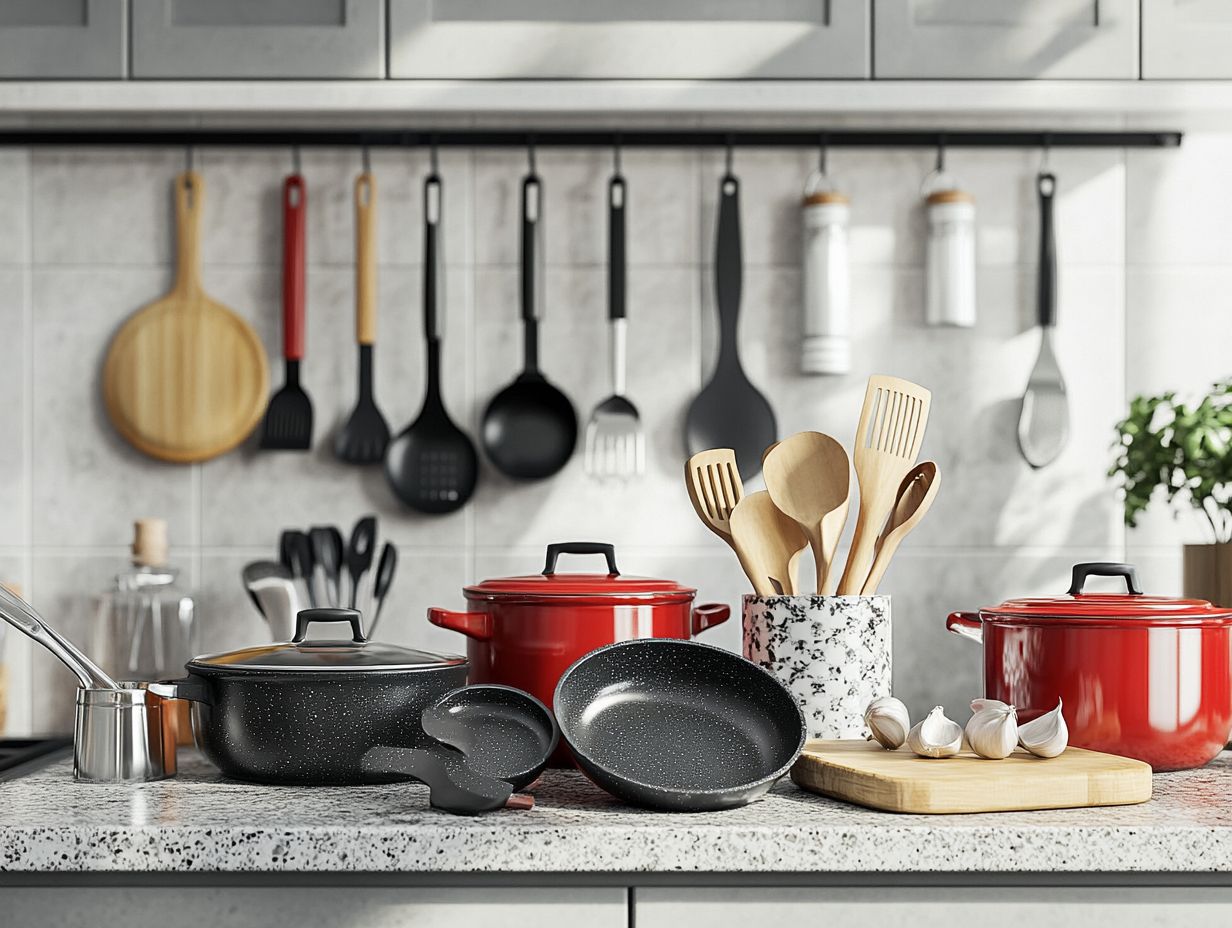
Selecting non-toxic and safe cookware is essential for cultivating a healthy kitchen environment.
Some materials can leach harmful substances into your food, so making informed choices is crucial for your health.
Materials to Avoid
When selecting cookware, it’s important to avoid materials that could pose health risks, especially if you prioritize non-toxic cooking.
Avoid Teflon and other nonstick coatings that contain a chemical used in some non-stick coatings. These can release toxic fumes when overheated, which is a hazard for both your health and your food.
Also, avoid cookware made from certain aluminum types and those with heavy metals, as they can leach harmful substances into your meals when scratched or heated.
Choosing alternatives like stainless steel, cast iron, or ceramic ensures a safer and healthier cooking environment while providing the durability you expect.
Certifications to Look for
To ensure you’re investing in safe cookware, look for certifications that confirm quality and safety standards. Reputable certifications like NSF International, FDA approval, and the American Society for Testing and Materials (ASTM) show that a product has undergone thorough testing for harmful substances and meets strict safety guidelines.
These certifications assure you of your cookware’s non-toxic nature while highlighting its durability and quality. Understanding these certifications can guide you toward reliable options, ensuring your culinary tools are both functional and safe for everyday use.
Cookware Maintenance and Care
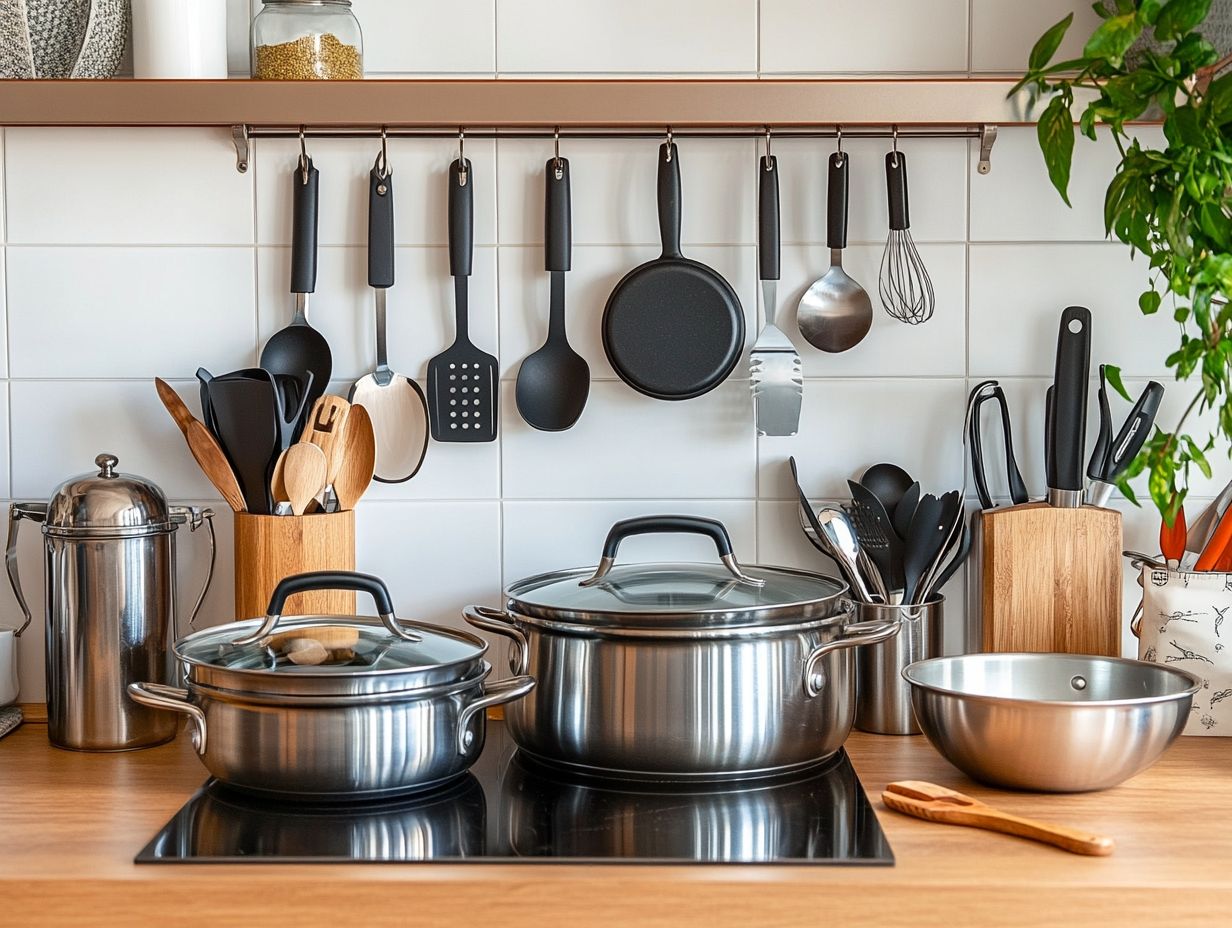
Keep your cookware in top shape with a little care—it’s essential for great cooking!
By investing a little time and attention, you can keep your cookware in excellent condition, allowing you to create culinary masterpieces with ease.
Best Practices for Cleaning and Storing
Implementing best practices for cleaning and storing your cookware enhances its longevity and performance.
Understand the specific needs of each material, such as stainless steel, cast iron, and non-stick, to ensure each piece retains its integrity.
For stainless steel, use gentle dish soap and a soft sponge. Cast iron requires a careful wipe-down with minimal water to prevent rust.
For non-stick surfaces, use softer utensils to avoid scratching, and polish copper regularly to maintain its shine.
Proper storage is equally important; stack cookware with protective pads or use dividers to prevent scratches and dents.
Paying attention to these details not only improves your kitchen’s performance but also enhances its visual appeal.
Take these steps to protect your kitchen investments and enjoy cooking more!
Cookware Sets vs Individual Pieces
When choosing between cookware sets and individual pieces, you should carefully consider the advantages and disadvantages of each option. This decision hinges on your cooking needs and lifestyle preferences.
Pros and Cons of Each Option
Cookware sets and individual pieces have unique advantages and drawbacks that cater to your cooking needs. When considering the best option, reflect on your cooking style and how often you create delicious meals.
If you enjoy experimenting with various recipes and techniques, a cookware set can offer a comprehensive solution. It typically includes essential items like pots, pans, and lids that work seamlessly together.
On the other hand, if you prefer specific types of cooking, opting for individual pieces might be the way to go. This approach allows you to invest in high-quality items that perfectly align with your culinary practices.
Ultimately, whether you choose a set or standalone pieces, it’s essential to make selections that resonate with your habits to enhance your cooking experience.
Watch this video to learn more about choosing the right cookware for your kitchen!
Frequently Asked Questions
- What factors should be considered when choosing kitchen cookware?
Consider the material, size, durability, and heat conductivity of the cookware. Also, think about your cooking needs and budget. - What are the different types of kitchen cookware?
The most common types include stainless steel, cast iron, non-stick, and copper cookware. Each type has its benefits and drawbacks, so choose one that meets your needs. - How does the material of kitchen cookware affect cooking?
The material can greatly affect the cooking process. For example, stainless steel is durable and versatile, while copper offers superior heat conductivity. Non-stick cookware is great for cooking with minimal oil. - What size of kitchen cookware should I choose?
Choose the size based on your cooking needs and the size of your stovetop. It’s important to have a variety of sizes for different dishes and cooking methods. - How can I ensure the durability of my kitchen cookware?
Check for a warranty and read reviews from other users. Proper care and maintenance, like avoiding metal utensils on non-stick surfaces and hand washing instead of using a dishwasher, are also crucial. - What is the recommended budget for kitchen cookware?
The recommended budget varies depending on the type and quality. It’s wise to invest in high-quality cookware that lasts longer and provides better cooking results. However, there are budget-friendly options available.
